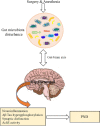Gut microbiota: a new player in the pathogenesis of perioperative neurocognitive disorder?
- PMID: 37786871
- PMCID: PMC10529199
- DOI: 10.1002/j.2769-2795.2021.tb00063.x
Gut microbiota: a new player in the pathogenesis of perioperative neurocognitive disorder?
Abstract
Perioperative neurocognitive disorder (PND), including postoperative delirium and postoperative cognitive dysfunction (POCD), is a common postoperative complication in elderly patients, who represent an expanding segment of our population. PND is a multifactorial disease resulting in higher morbidity and mortality. The precise mechanism of PND is yet to be fully delineated. Identifying the modifiable risk factors and mechanisms for PND would be an important step forward in preventing such adverse events and thus improving patients' outcomes. It is increasingly recognized that gut microbiota also manifest effects in the central nervous system via the microbiota-gut-brain axis, which has emerged as an important player in shaping aspects of behavior and cognitive function. Recent studies have found that patients with cognitive dysfunction after surgery and anesthesia have obvious gut microbiome disorders. These findings are paralleled by a growing body of preclinical investigations aimed at better understanding how surgery and anesthesia affect the central nervous system and possibly contribute to cognitive decline. Here, we present a broad topical review of the literature supporting the role of gut microbiota in PND. We provide an overview of the mechanisms underlying the pathogenesis of PND from pre-clinical and human studies. Therefore, gut microbiota could be a putative therapeutic target for PND in the future.
Keywords: Gut microbiota; Perioperative neurocognitive disorder; Probiotics.
© 2021 The Authors. Ibrain published by Affiliated Hospital of Zunyi Medical University and Wiley‐VCH GmbH.
Conflict of interest statement
There is no conflict of interest in this study.
Figures
References
-
- Bauer KC, Huus KE, Finlay BB. Microbes and the mind: emerging hallmarks of the gut microbiota‐brain axis. Cell Microbiol 2016. 18 (5): 632–644. - PubMed
Publication types
LinkOut - more resources
Full Text Sources

